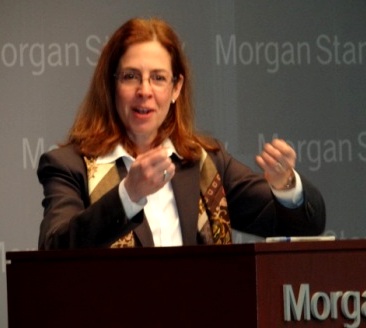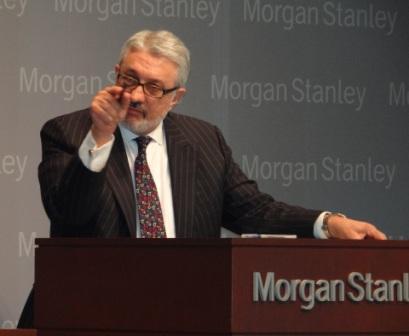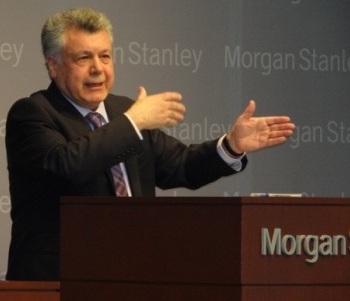On February 23, eighty participants from across the academic, political, and business sectors gathered at the Morgan Stanley Building in New York to discuss the Future of the Dollar and the International Monetary System.
Since the establishment of the Bretton Woods system, the U.S. dollar has held the status as the world's reserve currency. Yet, its real and perceived strength has wavered recently as the proportion of dollars held by foreign central banks declines, political and financial difficulties weigh on its value, and emerging markets' growing political and economic clout amplify calls for a diverse basket of reserve currencies. At the same time, foreign bank deposits at the Federal Reserve have skyrocketed since the end of 2010 and appear to strengthen the dollar's status in the short term.
Within this fluctuating environment, the Bretton Woods Committee convened a discussion among
- Linda Goldberg, Vice President, Financial Intermediation Function, Federal Reserve Bank of New York,
- Mansoor Dailami, Manager, Emerging Global Trends, World Bank, and
- Gabriel de Kock, Head of US FX Strategy, Morgan Stanley.
James D. Wolfensohn, Co-Chair of the Bretton Woods Committee, moderated the discussion; and, Richard A. Debs, Advisory Director of Morgan Stanley and Chair of the Bretton Woods Committee International Council, offered introductory remarks.

See Linda Goldberg's Presentation
Dr. Dailami explored the future of the broader International Monetary System (IMS). As global growth, investment, and production shift from industrialized to developing countries, he suggested that the IMS is rapidly becoming multi-polar and predicted a future multicurrency order centered around the U.S. dollar, the euro, and the renminbi. Dr. Dailami outlined three considerations central to the future shape of IMS:
- The legitimacy of a future system and its ability to accommodate the growing economic weight of developing countries
- Its ability to safeguard against protectionism and currency wars
- Its ability to foster stability and sustainability in global finance and in global capital flows
He also stressed that the agenda for IMS reform would need to move toward capital account convertibility in emerging markets, stabilize global liquidity creation, and incorporate the special needs of low-income developing countries.
See Monsoor Dailami's Presentation

When reflecting on questions from the audience, none of the panelists saw an expanded future role for the Special Drawing Rights of the International Monetary Fund. At the same time, they shared optimism about the increased cooperation and collaboration among governments in response to recent crises.
The Committee would like to thank Morgan Stanley for their generous support for this event.
Watch the program:

